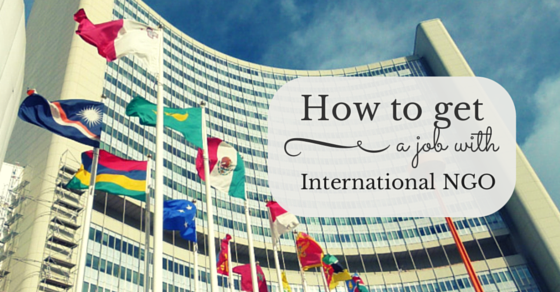NGO’s are generally organized by normal citizens with an aim to provide social and general services to the public. This is done with no intentions of making profits.
Hence they are also known as non-profitable organizations. There are various kinds of NGO’s; it could be handled by individuals/volunteers, groups, trusts etc. NGO’s are not concentrated in particular aspect of the requirement.
They are formed to fulfill the needs of various factors with respect to social, political, religious and many others.
There are also few international NGO who work in different aspects of this concept

Well most of these organizations or individuals frame NGO to mainly provide help to the general public, while others may also start this up for tax exemption that is allowed on the grounds of social service.
Since there are varied NGO’s to serve varied purpose, it is not easy to conclude NGO in one definition. This mainly depends on two important aspects namely; ‘work involved’ and their ‘orientation’. To classify a few NGO varieties, here are some examples;
- Human rights
- Environmental issues
- Socio – economic help
- Political issues
- Developmental issues and many others.
Well, the above-mentioned varieties fall into the category of ‘orientation’. Now we shall see how many kinds of NGO’s can be formed on the basis of their workability.
Depending upon the extent of work involved both horizontally and vertically the NGO’s are classified as:
- Local
- Regional
- National
- International
Well, this brings you a small gist of the meaning and purpose of NGOs in our system. Moving ahead there is a list of tips or suggestions that can help an individual to know about how to get a job with an international NGO.
However before we start right on the topic, it is advisable we discuss or relate on what and how does an international NGO work.
To begin with, let us know what is INGO – it means International non-governmental organization.
To be precise, both NGO and INGO mean the same and work for the same mission, the only difference is that INGO cascades to a larger portion of the globe including many countries and regions across the world.
The main intention of the INGOs is to provide relief and developmental aids to countries that are developing. It could be projected on health, education, social service etc.
It must be interesting to know that most of these INGOs are the first one to extend their hands to help during natural calamities or emergency situations at any given location in the world.
There are many INGOs who work in two different aspects of the concept. One, the INGOs who provide direct help or service and the other who tries to instigate or bring in change in the system to in-turn help the society or pupil of that particular country.
According to records, most INGOs have successfully influenced certain areas of concern in many countries and have proven to solve their issues.
If you are new to the world of such organization but crave to serve the society in your best interest then there are a few insights to know before concluding the kind of INGO you want to be part of.
Normally INGOs have greater tasks and challenges considering the situation and the distance involved in the service.
Getting into International NGOs is not an easy task; it does require a thorough knowledge of the subject or skill to handle the tasks.
How to get a job in an international NGO?
There are many options to enter into the world of INGO; however, below mentioned are a few steps on how can one get a job at an international NGO.
1. Assess yourself:
- Do you think you are interested in serving the society and can successfully contribute towards INGOs goal on a long run?
- Has this been your dream ever since you have known the world; or has this been just a passing thought?
- Can you dedicate your personal time at times of crisis at any given location in the globe?
- Can you manage yourself and also serve/help the needy?
- Most of all do you possess the strength to challenge various situations that may arise due to natural disasters or man-made disasters?
- Can you manage workloads or overtime work shift at NGO or INGO offices?
2. Strengthen your will:
Once you decide to be part of INGO then the next step is to strengthen your will by sinking into the following facts; emotional toll, energy supply, maximum work, pressure and cut off time, comfort level, pay limits, minimum resources, living standards, safety measures etc.
3. Build knowledge:
Having a basic idea of what is an NGO or INGO is a must for every individual who aspires to be part of this.
It is advisable to have a master degree in INGO to have a better relationship with many NGOs or to experience a good internship. There are many reputed Universities offering master course, development courses or other related courses on this subject.
To be a part of good INGO it is important to have an in-depth knowledge of civil society and international affairs.
4. Volunteer:
Even with a masters degree most of them find it difficult to get into NGOs. Having said this, if you get a job, then you will be paid nothing or sometimes bear minimum and this happens mostly with people who start their career in NGO or INGOs afresh.
Hence many a times to get a solid experience in the field, it does require for the individual to forego the payment and do service at free of cost.
And so by volunteering and supporting causes with no pay is another way to gain experience. This helps further in building contacts and growing rapidly amongst other societies.
5. Be open to offers:
As a beginner, it is important to gain experience in a local NGO in order to get a good INGO offer.
Hence, one must be open to accept the initial jobs that are offered in most NGOs. These jobs mostly are basic and the job task can vary from one level to another.
Also, some NGOs offer stipend and some don’t prefer paying. Hence, if you are passionate about serving the social purpose and want to pursue this as a career then you must be open to any kind of offers that may come from any kind of NGO.
6. Recognize opportunities:
Go through books, sites, papers to trace opportunities with INGOs OR NGOs. This will definitely help you contact people and get to know the insight about varied NGOs.
Also helps you to decide on what kind of work you prefer in an organization as such.
Some sites like idealist.com; jobsinNGOs; United Nations Career; Devex; Relief web; etc can offer you a good startup job with International NGOs.
7. Business task:
NGOs operations are similar to that of business operations. For instance; there are departments such as accounting, management, operations, back office, administration, logistics, marketing, public relations, human resource, legal dept, product development etc.
Starting a job with NGO does not mean being on the floor for all ground level work. There are various jobs as mentioned above that can be considered by individuals who are interested in getting into an INGO.
Each department is inter-related and hence this facilitates a wide operational level in an NGO and also fulfills the desire to be part of social service activities.
8. Communication:
Communication is a valuable asset with respect to jobs in NGO. The more we communicate the more translucent will be the work flow.
There are a number of works that are linked to perform an NGO task and by communicating effectively there will be no loops and hence this is one important aspect that helps you get a good INGO job.
Now having said this, it is also noticed that a good and effective networking can be done by candidates interested in this field to keep in touch with people who are already into such organizations. This will surely help them get started with NGOs.
It is tedious or difficult to pass messages or information to many developing countries due to lack of proper infrastructure or unreliable sources.
Hence communicating personally in such situations help candidates to overcome this issue and directly get in touch with International NGOs.
9. Acceptance:
You must be ready to accept any change that may force you to enter to gain a job in a NGO.
Especially when we talk about International NGOs, it is important that the candidate must accept the local change like the environment, stay, culture, language etc. These aspects matter for an interviewer during the selection criteria to judge a candidate.
10. Gear up your skills:
Apart from the term ‘acceptance’, most international NGOs also look into other major criteria’s of the job to select a candidate.
Depending on which they finalize the job offer. Pointed below are few facts they mainly look into:
- Effective communication
- Commitment
- Basic experience in working with any local NGO/non-profit sector
- Practical thinking
- Knowledge of Language
- Judgment
- Wise and mature thinking
However, these above mentioned aspects are not always applied. These depend on the kind of NGO that you approach and the work involved with them. They also depend on the location the NGO is situated.
11. Knowledge of language:
If you are applying for a job opportunity in an international NGO, then having a good knowledge of language accentuates the chances of getting more job opportunities.
This is because, when you aboard a new state or a location, knowing that regional language will definitely help overcome issues of communicating with government officials, other sponsors, donors, opposing parties, court officials, to understand legal terms etc.
It also helps in interpreting or drafting letters. Not only this, this skill will attract many international NGO to approach you. Hence this is another interesting way to bag a job at INGOs.
12. Specialized skills:
If you are a medical graduate or a master degree holder in medicine, for instance; nurse, nutritionist, doctor etc these skills will be surely considered in most of the NGOs.
Well, however, one must have a good amount of experience in an NGO with these specialized skills or should have worked as a volunteer (without pay) before entering into a paid INGO.
13. Building professional skills:
Fresh candidates, who would want to join INGOs as volunteers for experience can also enroll in any professional course alongside, that they think it can be relevant to the work or the job they want to prosper in an NGO.
Yes, this is one of the worthwhile steps for an individual to set up a good career with an NGO.
Candidates get to work and earn experience that may count as a valid point to enter into an International NGO and also study a particular professional skills or course that may relate to the jobs in an NGO so that they can choose to step ahead from the basic work to another level. This increases the ability of getting more job opportunities in INGOs.
14. Work whilst studying:
Just like building professional skills while at work, this concept explains how students studying at school, colleges or Universities can work for international NGO.
Many schools and colleges are offering such jobs to students who are interested in NGO activities.
Hence those students who are willing to make a career in NGO must utilize the opportunity and work for experience. This will help them in searching a better job in this field.
To conclude; International NGO or non-profit businesses are not an easy job as it involves a lot of dedication, commitment, co-operation, understanding, reliability and passion for working with. Having all these qualities it is natural for aspiring individuals, students, and master degree holders to want a bright future in the NGO sector. However, if you follow and walk at least a few of the above mentioned tips and steps, one can state that getting a job in INGO becomes better than impossible.
Please do write back to us your feedback on this article and we assure to answer any queries that you post.










































